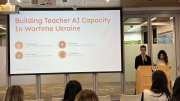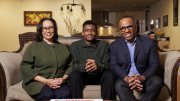Endowment Manager Earnings
Harvard Management Company’s (HMC) annual disclosure of the salary, bonus, and benefit payments to its president and five most highly paid portfolio managers, released on December 20, just before the University’s year-end break, revealed that compensation for the fiscal year ended last June tracked closely with the levels established in the prior year—well below the sums disbursed earlier in the decade. (Ironically, William A. Strauss ’69, M.P.P.-J.D. ’73, founder of the Capitol Steps comedy group, who was an outspoken critic of HMC’s pay system, had died of cancer two days earlier.) Mohamed El-Erian, president and chief executive officer, who announced his resignation in September and returned to Pacific Investment Management Company effective December 7, earned $6.5 million. The top-earning money manager, Andrew Wiltshire, managing director for natural resources, was paid $6.0 million, leading the group for the second consecutive year. He was followed by colleagues who earned between $2.1 million and $3.4 million. These paychecks reflected a year when HMC achieved a 23 percent return on endowment investments, and a 5.8 percentage-point margin of performance over market returns (the fourth highest in modern HMC history). During the 2003-2005 period, the top-performing managers, who oversaw enormous fixed-income portfolios, earned as much as $35 million in a year. When they left to set up an independent firm, El-Erian reorganized HMC, creating smaller portfolios.
From Hogwarts to Harvard
J.K. Rowling, author of the wildly popular Harry Potter novels, will be the principal speaker at the afternoon exercises during Commencement, on June 5. President Drew Faust made the announcement on January 17, citing Rowling’s unparalleled role in inspiring young people “to experience the excitement and the sheer joy of reading.”
Senior Spokesman
Vice president for government, community, and public affairs Alan J. Stone, who agreed to President Drew Faust’s request that he continue serving during the current academic year as she formed her new administration, has confirmed his plan to step down at the end of June. Faust has formed an advisory committee for the search for a successor; members include the deans of the Kennedy School of Government and the Graduate School of Education, three vice presidents, and two senior administrators involved in campus development in Allston, a major focus for the University’s community- relations efforts.
A Basis for Bioengineering
Venkatesh Narayanamurti, dean of the School of Engineering and Applied Sciences (SEAS), and Jeffrey S. Flier, dean of Harvard Medical School (HMS), have charged a six-member faculty committee with exploring whether the University can mount a broad bioengineering initiative, including both research and educational components. The idea, one of several that surfaced during earlier planning for interdisciplinary science (including programs in stem-cell research, computing, and microbial science—see “The Undiscovered Planet,” November-December 2007, page 44), will now be vetted on a fast track, with staff support from the provost’s office and the Harvard University Science and Engineering Committee, the body that coordinates and helps fund such ventures. The co-chairs are professor of systems biology Pamela A. Silver (HMS) and McKay professor of materials science Joanna Aizenberg (SEAS; she also holds professorial appointments in chemistry and chemical biology, and the Wallach professorship at the Radcliffe Institute). A draft report is due on March 31, with the final version expected by June 30.
Moving to a May Commencement
On January 15, as undergraduates labored through first-semester exams, Harvard announced its new calendar, to begin in the 2009-2010 academic year. Fall term will open early in September, and conclude with exams just before Christmas; there will be a three-week optional “winter session,” for schools to use as they deem fit. Spring classes will begin in the final week of January and conclude with Commencement as early as May 24 (2012) or as late as May 30 (2013); the first such Commencement, in 2010, falls on May 27. See www.news.harvard.edu/gazette/2008/02.07/99calendar.html for complete calendars.
Nota Bene
Leveraging leadership. The Kennedy School of Government’s Center for Public Leadership (www.ksg.harvard.edu/leadership) has received a $20-million bequest from the estate of the late Alan L. Gleitsman, a television executive. The funds will endow Gleitsman’s existing award program for international and citizen activists, and academic investments in student fellowships, visiting scholars, research, and curriculum development.
Applications avalanche. Selective colleges reported strong gains in applications for admission. Harvard received 27,278 applications, up 19 percent from the previous record of 22,955 received last year. Yale, Chicago, and Northwestern reported nearly comparable gains, and Dartmouth, Cornell, Duke, Princeton, and others have recorded strong growth as well. A larger high-school cohort, more aggressive recruiting, increased applications from international students and from lower-income families attracted by new financial-aid programs, and the sheer competitiveness of admissions (prompting the filling out of more applications) have all apparently contributed to the surge.
Outreach officers. Within the University’s community-affairs staff, Kevin Casey, who has led federal and state relations, has been promoted to associate vice president; Mary Power, who has been responsible for work with Cambridge, has been appointed chief of community relations and executive director of community initiatives (suggesting that Harvard may move toward more extensive partnership and community-benefits programs, involving education, affordable housing, and so on); and Kevin McCluskey ’76, M.P.A. ’86, chief liaison with Boston and the Allston neighborhood, has been promoted to senior director of community relations, Boston.
On other campuses. Boston College has submitted a master plan for Boston Redevelopment Authority review, the first step in a 10-year plan for $800 million of construction and renovation, much of it on a 65-acre parcel it recently purchased adjacent to its existing campus. The same authority must review Harvard’s Allston campus master plan. Columbia has won New York City Council approval to rezone 35 acres in Harlem, on half of which the university plans a 25-year, $7-billion expansion to accommodate science-research facilities, its business school and other schools, housing, and a site for a university-affiliated public secondary school for math and science students. Duke has received $40 million from the Duke Endowment, the foundation that is the university’s principal benefactor, to endow 10 new assistant and 10 new associate professorships, and to match funds for 12 new full professorships, all aiming to make innovative contributions to undergraduate education. Stanford has inaugurated a $4.5-million Faculty Development Initiative to appoint junior faculty members in the humanities and social sciences who specialize in the study of race and ethnicity.
Miscellany. Ray Williams has been appointed the Harvard University Art Museums’ first director of education, signaling an enhanced outreach effort to students and the public at large; he has held comparable roles at the Rhode Island School of Design Museum, the Peabody Essex Museum, and the Smithsonian’s Freer and Sackler Galleries.…The Harvard Gay & Lesbian Caucus has begun a $1.5-million campaign to endow the F.O. Matthiessen visiting professorship of gender and sexuality, meant to fund one-term teaching appointments (https://hglc.org matthiessen.html); Mitchell Adams ’66, M.B.A. ’69, a member of the Board of Overseers, co-chairs the fundraising effort.… The Carnegie Foundation for the Advancement of Teaching has named Anthony S. Bryk, Ed.D. ’77, president, effective this August; he has been on Stanford’s faculty since 2004, after previous service at the University of Chicago, where he was long involved in efforts to strengthen the city’s schools.…Gray professor of systematic botany Donald H. Pfister has been appointed dean of Harvard Summer School; he succeeds Robert Lue, professor of the practice of molecular and cellular biology, in the half-time position. Pfister, past Master of Kirkland House, is curator of the Farlow Library and Herbarium.…Harvard Law School’s Lambda student organization and Legal Services Center have established a new Gay, Lesbian, Bisexual and Transgender Law Clinic, providing pro bono and low-fee services to same-sex partners and families.…Spangler Family professor of business administration Debora L. Spar, Ph.D. ’90, has been named president of Barnard College, effective July 1.…Jazz saxophonist Joshua Redman ’91, who performed at President Drew Faust’s installation concert last October, will receive the Harvard Arts Medal on May 1 during the annual Arts First celebration.…The papers of the late Stephen Jay Gould, Agassiz professor of zoology, have been bequeathed to Stanford University.








